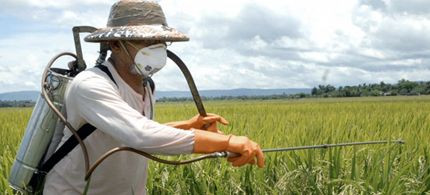Parkinson’s Disease Linked To Pesticide Exposure; Who Is At Most Risk?

We all know to wash our fruits and vegetables to ensure they're clean and pesticide-free for fear that we might get ill. But new research shows that the use of pesticides has a larger impact on human health than once thought, and those most at risk are individuals who are forced to deal with the harmful chemicals.
New research published in the journal Neurology has looked at 104 studies from around the world and compiled data on pesticide use and the risk of developing Parkinson's disease. The data varied from study to study, but strongly indicated that weed killer, solvents, and pesticides increased the risk of the neurological disorder by 33 to 80 percent. The studies from around the world looked at exposure to pesticides, insecticides, weed killers, fungicides, solvents, organophosphates, paraquat, maneb/mancozeb, organochlorines, and dichlorodiphenyltrichloroethane (DDT) all used in agriculture. The research also drew a direct correlation between the length of time spent exposed to these harmful agricultural chemicals and the risk for developing Parkinson's disease.
The researchers also evaluated the risk for Parkinson's in those directly working in agricultural jobs and found it was roughly one-third higher. The study stated that they had "confirmed the risk associated with agriculture jobs." And although they found a severe increase in the rate of Parkinson's in those exposed to various chemicals, they found no link between DDT, a chemical banned in the United states for decades, in Parkinson's development. Exposure to the weed killer paraquat or the fungicides maneb and mancozeb were found to increase the likelihood of becoming affected by Parkinson's by almost two times.
Parkinson's disease is a neurological condition that manifests itself in degradation of motor control and tremors. Typically, a neurotransmitter called dopamine is insufficiently produced or does not function properly in the brain. Treatment options are limited and consist of using levodopa (L-Dopa), a different form of dopamine or dopamine agonists that try to simulate an increase in dopamine in the brain.
It's not a stretch in thinking to understand that chemicals, which have the sole purpose of killing other organisms, even knowing that many insecticides themselves are neurotoxins for insects, would cause some sort of neurological problem in humans. And although the researchers did not distinguish the difference between those who were exposed to the chemicals through their skin and through breathing them in, the risk was still prominent.
It is known that many of the chemicals used on produce have a relatively short half-life and break down after certain periods of time and can be washed off during food processing. But those at most risk are the people who are working in the fields by either spraying the chemicals or picking the produce that ends up on everyone's table. In the United States, these people are typically underpaid and undocumented workers, who spend months on end in the fields of large agricultural farms being exposed to dangerous chemicals day in and day out. It is estimated that 60 percent of all farm workers in the U.S. are undocumented and more than 78 percent are foreign-born and had come across the border illegally, holding neither real rights nor recourse against large companies for better working conditions, according to the Southern Poverty Law Center.
These chemicals have become a necessary evil of the current agricultural industry and the need to produce food on an industrial scale. They have reduced the percentage of crops, which are wasted by becoming infected or eaten by insects and rodents, and have protected them from infections as well. Yet the human cost on the side for those who cannot afford health care and are used for their backbreaking, intensive labor is immeasurable.
Source: Pezzoli G, Cereda E. Exposure to pesticides or solvents and risk of Parkinson disease. Neurology. 2013.
Published by Medicaldaily.com



























